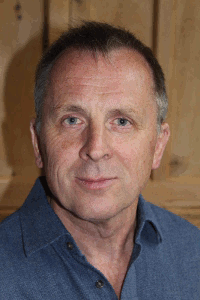
Born in 1957, David Matthews spent his childhood at Lee-on-the-Solent, Hampshire. His father, Elton, lectured in radio chemistry at the college which became Portsmouth Polytechnic and then Portsmouth University. His mother, a teacher, gave up work to look after the family. This was an unusual one. Elton Matthews was closer in age to his new mother-in-law than he was to his wife. Fifteen years her husband’s junior, Daphne Matthews was closer in age to her eldest stepson than she was to her husband. There were four stepsons. The youngest was only a year old when his widowed father remarried. David came along nine months later. Two girls were born over the next few years. By 1966, both sets of grandparents had moved in. One set in the house and the other in a large mobile home (the caravan), permanently parked in the back garden.
Elton Matthews was a Quaker and David, his youngest half-brother and the elder of his sisters were all educated at Sidcot, a Quaker boarding school in the Mendip Hills. These were happy days and a welcome relief from the tensions building up at home as Daphne Matthews’ health deteriorated and she ‘converted’ from being a staunch Anglican to a Jehovah’s Witness. (It was difficult to tell what was cause and what effect.) Christmases and birthdays were phased out of the calendar and Armageddon inked-in for 1975.
1975 was also the year David left school. Whilst the end of the world was clearly on hold, its anticipation had created disturbance enough to prompt him to forego applying to university in favour of a career in the forestry commission. A place at the Forestry College in Penrith was secured on completion of two years’ work experience. After three months hard labour in Devon, lacking any intellectual stimulation, David secured a place to read English Literature at King’s College, London, instead. He filled in the rest of the year doing odd-job gardening back home in Hampshire.
Three years followed, immersed in literature and relishing London theatre. This was a coming-of-age time. It was over too quickly with no plans laid for the future. After a few months working for a small firm which sold personalised matchboxes and nearly a year working in a printer’s in Covent Garden, David moved with a university friend, who had got a job at Oxford University, to Boars Hill.
It was whilst living at Boars Hill, that David trained to be a teacher, became a Roman Catholic and met his future wife. His first job, as a teacher of English and Assistant Housemaster, was at All Saints’ School, Bloxham. His time here was idyllic: teaching A-level, producing school plays, editing the school magazine, putting his skill with a chain-saw to good use producing firewood as a ‘community service’ alternative to assisting with the cadet corps, and being utterly at home in the Common Room surrounded by witty, congenial colleagues. It was hard to beat.
All Saints’ School was not, however, in the state sector and David felt a nagging obligation to teach the less privileged. After two and a half years at Bloxham, he moved to Stourport-on-Seven High School confronting challenging pupils for the first time whilst gathering the wider experiences which enabled him to apply for and get a job, after another two and a half years, as Head of English at Archbishop Tenison’s School in Croydon.
Croydon has remained his home ever since. This town, with its rich cultural diversity, has been the setting for marriage, three sons and a fulfilling career, culminating in eleven years as head teacher of St Andrew’s School. It was here too that his Roman Catholicism morphed into Anglicanism, the Christian denomination of his childhood. For eight years, until 2017, he was churchwarden at St Andrew’s Church.
Retirement in 2015 gave David and his wife the chance to buy a dilapidated cottage in south-west France and do it up as a country retreat. David’s social conscience is assuaged by his work as Chair of trustees of both a local charity, which he helped found, and a pre-school. But freedom from a hectic working life provides the space to realise a life-time’s ambition to write. Sheaves of half-baked material, accumulated over many years, can now be turned into polished works.